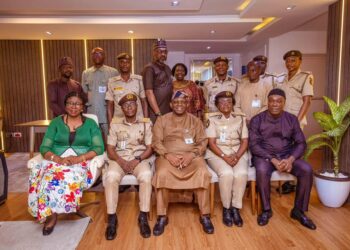Recently, President Umar Yar’ Adua sent an executive bill to the National Assembly for the creation of a maritime security agency by the federal government as a follow-up to the recent amnesty deal with the militants in the Niger Delta region.
The move is already generating anxiety within the maritime sector, creating discord within the military and putting the national assembly under serious pressure.
If the Maritime Security Agency bill sails through, it then means that Nigeria will have another agency to take charge of safety of maritime as well as oil and gas installations within the nation’s territorial waters.
The powers of the proposed agency are as wide as the imagination of its promoters. If passed into law, the Maritime Security Agency will have wide ranging powers; including performing coastguard functions, inspection of ships, arrests of suspects and carriage of light arms within the Nigerian coastal territory.
The Presidency has linked the initiative to the need to ensure that the current state of peace which is evident in the Niger Delta is sustained and to this extent, we commend the President for the relative peace in the once-volatile region.
The Niger Delta, apart from being a distinct component of Nigeria, is also the hub of the nation’s oil and gas sector; it is also strong component of the nation’s maritime sector hosting at least four ports. It is this unique natural endowment that makes the relationship between the region and the maritime sector a symbiotic one, in which case, the region’s aquatic endowment makes it a maritime region.
While the militancy in the region may be blamed for the unrests in the oil and gas sector, its effect is not limited to the sector alone as the international shipping community has severally complained about rising attacks on ships and other water crafts including, fishing trawlers within the Nigerian coast. In the attacks, captains and crew members of vessels calling in Nigerian ports have been killed and maimed with valuables lost to daredevil sea robbers.
Apparently, in response to repeated outcry by stakeholders, Nigeria’s chief of defense staff, Air Chief Marshal Paul Dike sometime ago inaugurated an 11-member inter agency task force to tackle the unrests and militancy as well as sea robbery on Nigerian waters.
Just like we predicted at that time, that security committee was not able to stop these militants who masquerade as sea robbers and whose sophisticated fire power is not in doubt. Arguably, the committee only succeeded in harassing helpless owners of private jetties and tank farms in Lagos.
It is noteworthy that the move to create a new agency did not emanate from that committee, but from an earlier child of circumstances in the name of Presidential Implementation Committee on Maritime Safety and Security (PICOMSS); a body that was created in 2004 as a result of the need for Nigeria to meet the deadline for the implementation of the International Ships and Ports Security (ISPS) Code. The story of PICOMSS is well known and does pot require much dwelling on.
The caliber and spread of concerned stakeholders who thronged the House of Representatives last week for the public hearing on the Bill is sufficient proof of the awareness that stakeholders in the maritime sector has.
The ‘dangers’ that are inherent in the Bill has been well articulated by virtually everyone who spoke at the National Assembly last week and even before the public hearing.
It is generally agreed that if the Bill is passed by the legislature, the agency will be in conflict with the provisions of the law which established the Nigerian Maritime Administration and Safety Agency (NIMASA), Merchant Shipping Act as well as some provision of the Cabotage Act. It will also undermine the preferred option of having a National Coast Guard, the Bill of which is currently before the National Assembly. Thirdly, it will create a dangerous division within the rank and file of the military and may threaten the age-long spirit of camaraderie.
From commercial shipping point of view, the Bill represents additional levy on importers and by implication, on Nigerians who are already burdened by excessive taxation and high cost of living. The Bill makes provision for collection of a maritime security levy and another 1per cent of the value of all inward and outward bound cargo.
Coming on the heels of the introduction of a container tracking levy on all imports into Nigeria, the new agency will put more holes in the pockets of Nigerians.
We align our position with that of stakeholders who have expressed opposition to the Maritime Security Agency Bill, even as we submit that rater than create another empire for some set of people, government should strengthen existing MoU between Navy and NIMASA.
We also urge the National Assembly to be guided by national interests and popular public opinion in this matter.
















Discussion about this post